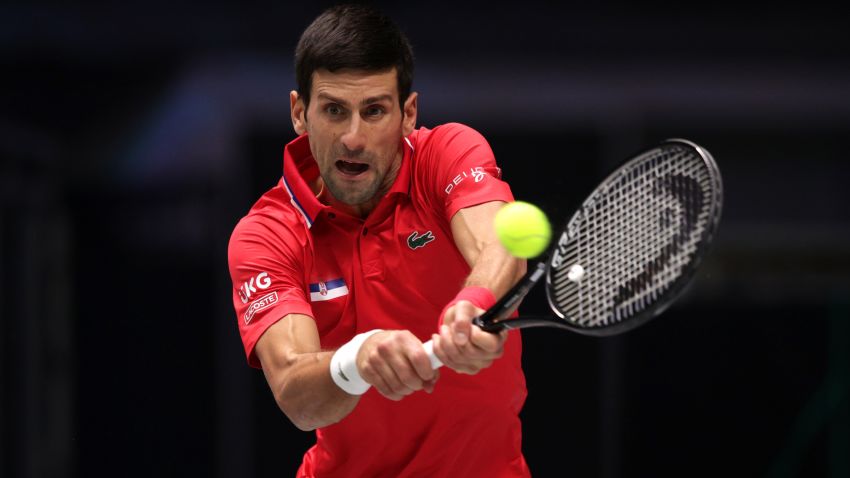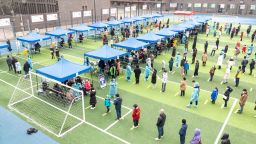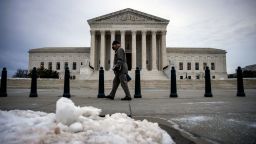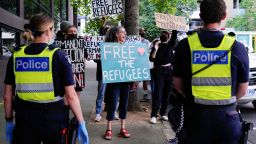Living with the virus, as the world is finding out, is easier said than done.
From the US Supreme Court to Australian Open tennis courts, and from a French President vowing to “piss off” the unvaccinated to China’s iron fist pre-Olympic lockdowns, Covid-19’s political fallout is ever more contagious.
Far from alleviating the extreme dilemmas the pandemic presents leaders, the milder Omicron variant is making them more acute – partly because its transmissibility is still filling hospitals and gutting vital workforces. And yet, as the global crisis enters a third year, there’s a palpable sense that populations, at least in democracies, are beginning to move on – through exhaustion or collective common sense – to a new accommodation with Covid-19. But China’s Communist rulers are going in the opposite direction, locking down millions of their people as they try to prevent the Winter Olympics – a showcase for the country’s emerging superpower might – from becoming a humiliating epicenter of infection.
In the US and parts of Europe, meanwhile, this shift is also being driven by the fact many people have tested positive, or know someone who has, and experienced few symptoms, leading to questions about the logic of current public health guidance, including recommendations for people to isolate, even if they are asymptomatic and fully vaccinated.
But the pandemic pattern that saw national, state and local governments struggle to keep up with the chameleon threat of an invisible enemy is being repeated in this new phase of the struggle. Many are rushing to adapt Covid isolation protocols and testing and booster shot regimes specific to Omicron, balancing a desire to alleviate often record hospitalizations with the lessened impact of the virus elsewhere.
But Covid-19 has lost none of its capacity to exacerbate existing cultural and ideological political divides, especially in the United States. The explosive political brew of increased transmissibility and the cumulative social and human toll of the long fight against Covid has played out, for example, in a bitter but newly eased Chicago showdown between the city’s mayor and the teachers’ union over reopening schools. Elsewhere, conservative governors who long saw political advantage in downplaying the virus may now look ahead of the curve, though at the cost of many lives, while Omicron is only beginning its assault on the heartland.
Early in the pandemic, then-President Donald Trump was criticized for putting political and economic considerations ahead of science. But there are growing signs that leaders like President Joe Biden, French President Emmanuel Macron or Australian Prime Minister Scott Morrison are now also adopting a more politicized approach, driven by shifting public opinion, circumstance and electoral self-preservation. Leaders now insist schools must stay open, lockdowns are not an option and, in some cases, argue that the unvaccinated – who make up most of those in intensive care units – have made their choice.
A critical Supreme Court case
In Washington, the administration is on tenterhooks to see whether one of the prime weapons of Biden’s armory against the virus – vaccine requirements for large companies and certain health care workers – will survive a skeptical Supreme Court.
The decision is expected at any time, but a hearing last week featured a conservative majority apparently open to arguments that Biden overstepped his powers, at least with regard to big business. Betraying its anxiety, the White House on Monday circulated a opinion piece from “The Hill” newspaper by a George Washington University School of Medicine expert that warned that Covid-19 was “killing the nation’s workforce” and urged the justices to uphold Biden’s mandates.
The case, rooted in challenges to the measures by Republican-led states, revives the long duel between individual freedom and the extraordinary measures the government uses to fight a pandemic that threatens everyone regardless of political affiliation. If the court rules against the administration, it’s hard to argue that it will not be responsible for more sickness and death simply because of the realities of the virus. At a minimum, big firms will have to consider their own powers to require vaccination, a factor that could delay post-Omicron reopening or have economic impacts at a time when the virus is still killing an average of more than 1,200 Americans every day.
Famous vaccine skeptic holds serve in Australia
The Supreme Court case is a test of the complicated choices being forced on Western democracies by the worst pandemic in 100 years. In some ways, as divisive as it is, this is the safety valve of democracy working as it should – allowing the airing of opposing opinions at a time of national stress.
As Biden struggles to fulfill his vow to close down the virus, he has the consolation of not facing the political heat alone.
The extraordinary saga in Australia of tennis star and vaccine skeptic Novak Djokovic, who was just freed from immigration detention over a dispute over his visa ahead of the Australian Open, has put Morrison’s government in the eye of a political storm. The 20-time Serbian Grand Slam champion was freed by a judge who ruled he had been treated unfairly by border authorities after arriving in the country on a vaccine exemption. Claims by the multimillionaire celebrity’s family that he was a political prisoner were an insult to those languishing in jail in places like China, Myanmar or North Korea. But like Brooklyn Nets star Kyrie Irving and Green Bay Packers quarterback Aaron Rodgers, Djokovic has become a kind of sporting dissident, and their stands on vaccines have made them heroes for skeptics and headaches for their sports.
Morrison’s government has every political incentive to take a tough stand against Djokovic. Firstly, everyone traveling to Australia, even citizens, needs to show proof of vaccination with rare exceptions. The country has endured almost two years of near isolation from the rest of the world. Families were split. Now, many Australians suspect that Djokovic got special treatment because of who he is and his capacity to pay a high-powered legal team.
“Rules are rules, especially when it comes to our borders. No one is above these rules,” Morrison tweeted last week. The government in Canberra is still deliberating whether to deport Djokovic a week ahead of the championships in Melbourne. This drama could hardly have played out in a worse place; the city has endured some of the world’s most punitive lockdowns. Morrison’s mind, meanwhile, will be concentrated on the fact he faces reelection in May. And while his government won early plaudits for keeping Covid out of the country with restrictions far more onerous than those experienced in the US early on, there’s now deep national fatigue.
And although many are angry at Djokovic, his case is also raising questions about whether such strict entry rules make sense any more with Omicron spreading like wildfire. Morrison has tried to straddle the political debate by saying the country must move past the “heavy hand of government” by ending lockdowns, but he’s getting hammered by the opposition and feuding with states like Western Australia and Queensland that adopted more cautious Covid-19 guidance.
Macron’s uncompromising shift
The case of Djokovic also intersects with another debate: the extent to which those who have refused to take safe, mostly free and effective vaccines are now responsible for curtailing the freedoms of the fully vaccinated and boosted.
In the United States and elsewhere, limitations on daily life might be less restrictive had more people taken their shots – and been largely protected from the serious illness that is threatening to swamp hospitals. In many cases, those most reluctant to embrace vaccines often also come from conservative areas where measures like social distancing and mask-wearing are less observed. But the clashing cultural responses to the pandemic underscore America’s creed of individualism and broad suspicion of European-style collective responsibility.
In France, however, President Emmanuel Macron, is putting his political credibility on the line with a tough stance against the unvaccinated. Like Morrison, Macron is within weeks of an election. The French President, who has often seemed imperious in the Elysée Palace and has had an up-and-down relationship with the public, is pushing stiffened legislation that would require a vaccine pass to enter restaurants, bars and to travel inside the country.
“Now the unvaccinated, I really want to piss them off. And so, we’re going to keep doing it, until the end. This is the strategy,” Macron told “Le Parisien” newspaper last week. His plan to ostracize the unvaccinated caused a political uproar and would never fly in the US. But it may be less of a gamble than it looks. His polling before the two-round presidential election in April is robust, and he waited until more than 74% of French people were fully vaccinated – one of the highest rates in Europe – before taking his stand. If Macron wins a second term, he will be one of the few Western leaders so far who has managed to master the politics of the pandemic.
An Olympian crackdown
Complaints, however, that Macron is betraying Napoleonic instincts pale in comparison with draconian measures adopted by China to suppress new outbreaks of the virus that first emerged in the central city of Wuhan before spreading worldwide.
Authorities just imposed various levels of lockdown isolation on the city of Tianjin, and plan to test 14 million residents after the discovery of a small number of Omicron cases. The move is a nightmare scenario for the communist leadership since Tianjin is only 80 miles from Beijing, which will next month host the Winter Olympics.
China’s party bosses have placed extraordinary political prestige on holding the Games, and a major outbreak in the athletes village would be a public relations disaster. Tight restrictions are in place for competitors, officials and media entering China for the Olympics. But given the highly transmissible Omicron variant, it is hard to see how China’s attempt to completely keep its more than 1 billion people isolated is sustainable in the long term, especially since the country has been largely cut off from the world for two years.
Even in an authoritarian nation, the pressures of the pandemic create serious strains, although they may not be as openly discussed as those in a democracy, especially one as internally divided as the United States. Strongman President Xi Jinping has tried everything to ensure China lives without Covid-19. But even he may now have no choice but to live with it, as difficult as that may be.





